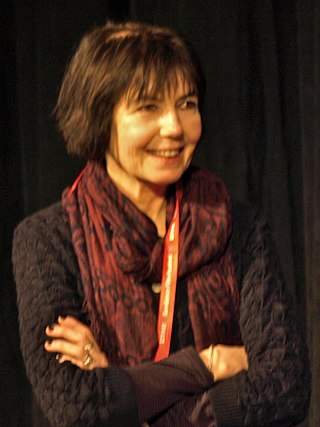
Kim Longinotto is a British documentary film maker, well known for making films that highlight the plight of female victims of oppression or discrimination. Longinotto has made more than 20 films, usually featuring inspiring women and girls at their core. Her subjects have included female genital mutilation in Kenya, women standing up to rapists in India, and the story of Salma, an Indian Muslim woman who smuggled poetry out to the world while locked up by her family for decades.
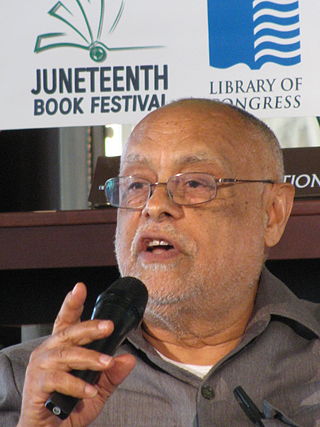
Haile Gerima is an Ethiopian filmmaker who lives and works in the United States. He is a leading member of the L.A. Rebellion film movement, also known as the Los Angeles School of Black Filmmakers. Since 1975, Haile has been a film professor at Howard University in Washington, D.C. He is best known for Sankofa (1993), which won two awards.
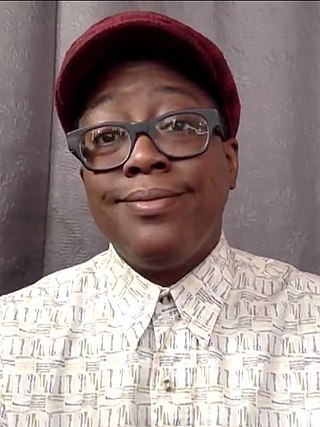
Cheryl Dunye is a Liberian-American film director, producer, screenwriter, editor and actress. Dunye's work often concerns themes of race, sexuality, and gender, particularly issues relating to black lesbians. She is known as the first out black lesbian to ever direct a feature film with her 1996 film The Watermelon Woman. She runs the production company Jingletown Films based in Oakland, California.
Borom Sarret or The Wagoner is a 1963 film by Senegalese director Ousmane Sembène, the first film over which he had full control. It is often called the first film made in Africa by an African; the first "professional" African film; or the first such film to be shown widely outside of Africa. However, this is disputed, with some other films, such as Song of Khartoum, Sarzan, and Mouramani having arguably been produced earlier. Thus, some authors refer to it as "among the first" films made in Africa by an African filmmaker. Borom Sarret is 18 minutes long and tells a story about a cart driver in Dakar. The film illustrates the poverty in Africa, showing that independence has not solved the problems of its people. It was shown as part of the Cannes Classics section of the 2013 Cannes Film Festival.
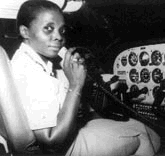
Thérèse Sita-Bella, born Thérèse Bella Mbida, was a Cameroonian film director who became the first woman filmmaker of Africa and Cameroon.
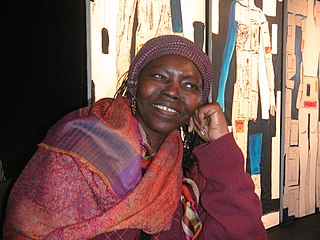
Safi Faye was a Senegalese film director and ethnologist. She was the first Sub-Saharan African woman to direct a commercially distributed feature film, Kaddu Beykat, which was released in 1975. She has directed several documentary and fiction films focusing on rural life in Senegal.

Rakhshān Banietemad is an internationally and critically acclaimed Iranian film director and screenwriter who is widely considered a premier female director and her films have been praised at international festivals as well as being popular with Iranian critics and audiences. Her title as "First Lady of Iranian Cinema" is not only a reference to her prominence as a filmmaker, but also connotes her social role of merging politics and family in her work. Her signature style is that she focuses on a character representing a part of society to explore it while staying objectively neutral. The first period of Banietemad's cinematic activity originates from dark humor. Still, in the second period of her work, dark humor gives way to serious and influential films, and deeper and broader issues are addressed. Banietemad has a more realistic view of life.

Women Make Movies is a non-profit feminist media arts organization based in New York City. Founded by Ariel Dougherty and Sheila Paige with Dolores Bargowski, WMM was first a feminist production collective that emerged from city-wide Women's Liberation meetings in September 1969. They produced four films by 1973. Dougherty and Paige incorporated the organization in March 1972 as a community based workshop to teach film to everyday women. A distribution service was also begun as an earned income program. In the mid-1970s a membership was created that screened and distributed members' work. In the early 1980s focus shifted to concentrate on distribution of independent films by and about women. WMM also provides production assistance to women filmmakers.

Women are involved in the film industry in all roles, including as film directors, actresses, cinematographers, film producers, film critics, and other film industry professions, though women have been underrepresented in creative positions.

Leïla Kilani is a Moroccan director, screenwriter, and producer. Kilani has worked on films such as Nos Lieux Interdits (2008), Zad Moultaka (2003), and directed the feature film On the Edge (2011). Kilani was born in the city of Casablanca in the northern part of Africa.
Gloria Victoria Rolando Casamayor, known as Gloria Rolando, is a Cuban filmmaker and screenwriter. Her career as a director spans more than 35 years at the Cuban national film institute ICAIC, and she also heads Imágenes del Caribe, an independent film-making group. Her films, such as Reshipment (2014), characteristically document the history of people of the African diaspora.
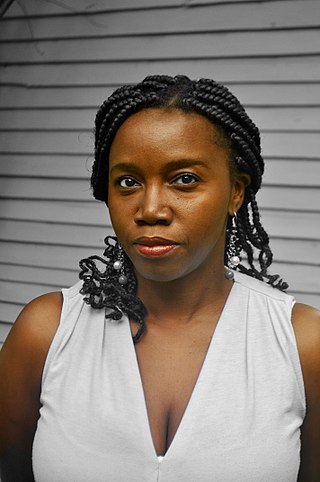
Rumbi Katedza is a Zimbabwean Film Producer and Director who was born on 17 January 1974.
Aminata Ouédraogo is a Burkinabé filmmaker and administrator. She is general coordinator of the Pan-African Union of Women in the Image Industry (UPAFI).
Hachimiya Ahamada is a French film director of Comorian descent, known for her films about the Comoran diaspora.
Women are involved in the African film industry in a variety of roles, though they have been underrepresented in creative positions.

Lobé Ndiaye is a Senegalese writer and documentary filmmaker. She won the Dada Gbêhanzin Award in 2019.
Annette Kouamba Matondo is a film director, journalist and blogger from the Republic of the Congo. She is editor of La Nouvelle République, a newspaper based in Brazzaville. Her first film, On n'oublie pas, on pardonne, commemorates the disappearance of 353 refugees in 1999 from the port in Brazzaville. In it the actress Sylvie Dyclos-Pomos writes a play based on the event. The title uses a phrase associated with Nelson Mandela. The film was described by film-maker Beti Ellerson as "cathartic". Her second film, De quoi avons-nous peur? raises awareness of censorship and self-censorship in journalism. In a third film, Au-delà de la souffrance, she draws attention to the explosion on 4 March 2012 at an ammunition depot in Mpila.
Mounira Bhar is a Tunisian filmmaker. She holds a Master of Advanced Studies in aesthetic philosophy obtained at the Sorbonne.

Sara Gadallah Gubara Al-Faki Ibrahim is a Sudanese competition swimmer and film director. She was the first Sudanese woman to participate in international swimming competitions, such as the Capri International long-distance swimming race in Italy, and the first Sudanese woman to swim the English Channel to France, despite having contracted polio in childhood. Further to her lifelong activity as a sportswoman, she became noted as a pioneering female filmmaker in her country, first assisting her father, Gadalla Gubara, and later directing her own films.

Soraya Milla, is a French independent filmmaker, film director and film producer. She is of Cameroonian–Beninese descent, and her work often is focused on Black identity and issues of dual culture.













